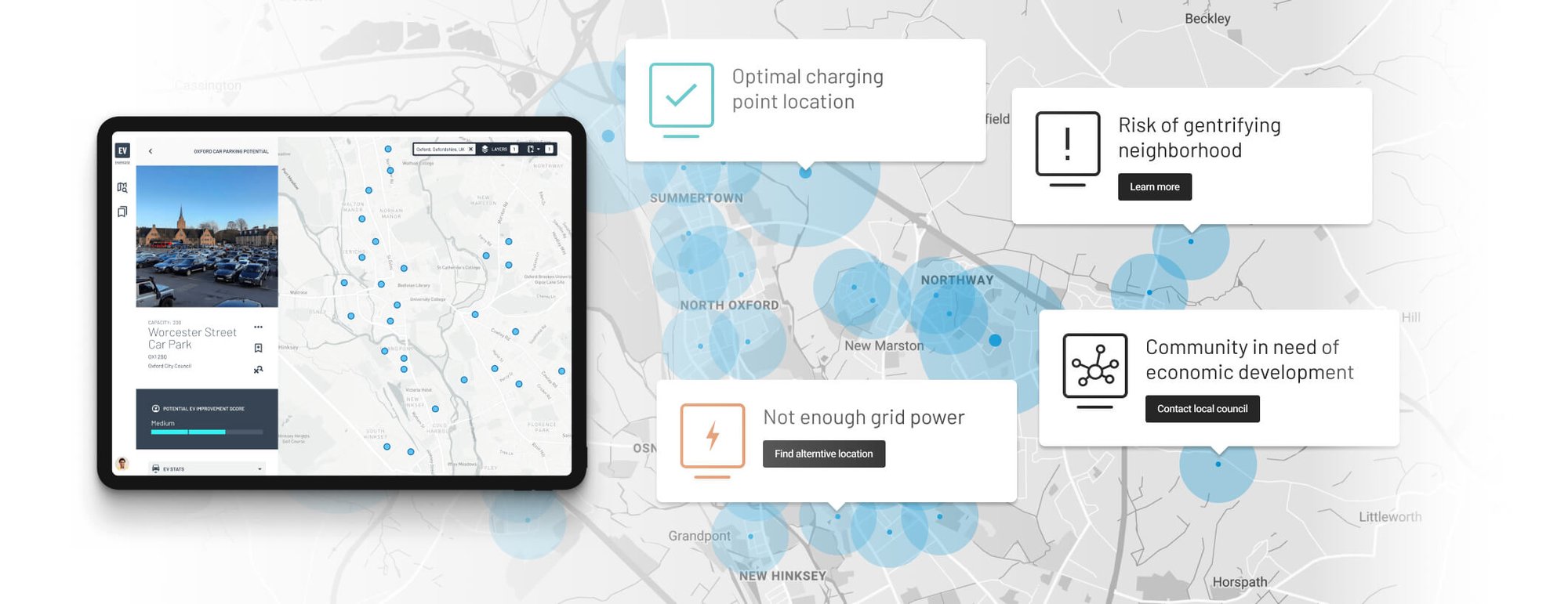Case Study
Optimising electric vehicle charging for Oxfordshire County Council
Combine multiple data sources into one AI solution that makes the
rollout of EV infrastructure as efficient, equitable, and beneficial as possible.
![]()

Problem:
With new technology comes new obstacles and complications, and as electric vehicle (EV) numbers continue to rise, it is estimated that more than 400,000 new EV charging points will be required in the UK alone to keep cars fully charged. Where to put them is a big problem. Recent figures suggest a growing disparity between the number of EVs and the level of charge point infrastructure, as well as a “regional divide” within the distribution of this infrastructure.
The situation calls for a different approach to how EV infrastructure is implemented to ensure that, as more people switch to EVs, everyone who needs to access a charging station can do so, regardless of geographical or socio-economic factors.
In a bid to support the UK’s ambitious targets, Mind Foundry worked alongside Oxfordshire County Council (OCC), and others, using AI to optimise infrastructure budgets, ensure ethical considerations for local communities and distribute power more efficiently.
Solution:
Mind Foundry’s solution combines geospatial modelling with a variety of different data sources and advanced uncertainty awareness forecasting to intelligently model and predict the changing requirements for EV charging infrastructure.
The Mind Foundry Platform provides key optimisations for planners, charge point operators and energy providers. This enables disparate departments to communicate with each other, and collaborate with AI at a more fundamental level. Given the wide range of multi-sectoral data, OCC are able to visualise and analyse insights to uncover EVs and energy-related issues, within a specific geographical area.
The iterative workflows are powered by scalable probabilistic machine learning and connect to both live and historic data sources, providing sophisticated scenario modelling and rollout planning capabilities. These forecasts are sensitive, not only to immediate demand, but long-term strategy. The platform has natural extensions to monitor and manage the available electricity capacity, enabling smart, data-driven resource optimisation.
Results:
The solution provides an advanced, transparent and data-driven approach for OCC to optimise their EV charging infrastructure. It enables them to work closely with energy providers and charging suppliers and ensure the placement of charging stations is efficient, accessible and fair for UK citizens.
OCC are empowered to interrogate, extract and strategise meaningful data, driving critical business decisions in a responsible and transparent way. They are able to understand the limitations of available data that is at their disposal today, and the data that is required to make a better decision tomorrow. Mind Foundry enables our customers to:
-
Increase profits from charging stations.
-
Better manage local and national electricity demand.
-
Ensure ethical considerations for local communities.
-
Optimise infrastructure budgets.
"The importance of deploying the right type of charging asset in the right location to meet the demands of a rapidly increasing requirement for chargers against the need to minimise disruption cannot be overemphasised. A flexible, easy-to-use mapping system utilising readily accessible data is a key component of the analysis that needs to take place to make this happen and the solution being developed by Mind Foundry has the potential to make this work easier, simpler and more accurate than anything we’ve used before."
Paul Gambrell
Team Leader - EV Integration
Read the full story
Explore the ways Oxfordshire County Council used the Mind Foundry Platform to plan their charge point rollout.
4 min read
Let’s Use AI Responsibly to Discover Where to Place EV Charge Points
William Chapman:
Stay connected
News, announcements, and blogs about AI in high-stakes applications.
